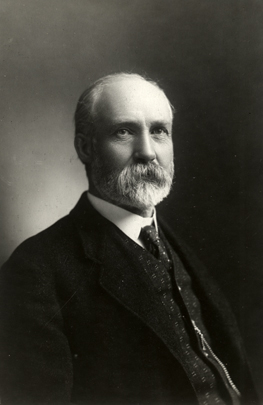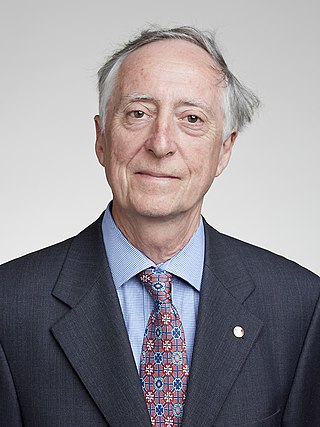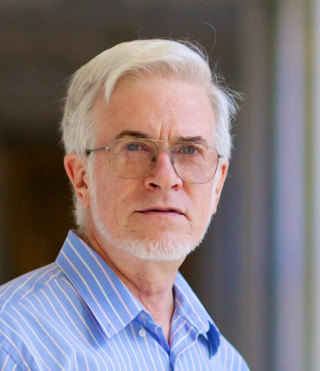Related Research Articles

The Royal Society of Canada, also known as the Academies of Arts, Humanities, and Sciences of Canada, is the senior national, bilingual council of distinguished Canadian scholars, humanists, scientists, and artists. The primary objective of the RSC is to promote learning and research in the arts, the humanities, and the sciences. The RSC is Canada's national academy and exists to promote Canadian research and scholarly accomplishment in both official languages; to recognize academic and artistic excellence; and to advise governments, non-governmental organizations, and Canadians on matters of public interest.

Raymond Urgel Lemieux, CC, AOE, FRS was a Canadian organic chemist, who pioneered many discoveries in the field of chemistry, his first and most famous being the synthesis of sucrose. His contributions include the discovery of the anomeric effect and the development of general methodologies for the synthesis of saccharides still employed in the area of carbohydrate chemistry. He was a fellow of the Royal Society of Canada and the Royal Society (England), and a recipient of the prestigious Albert Einstein World Award of Science and Wolf Prize in Chemistry.
James Hemphill Brown is an American biologist and academic.
William Sefton Fyfe, was a New Zealand geologist and Professor Emeritus in the department of Earth Sciences at the University of Western Ontario. He is widely considered among the world's most eminent geochemists.

Arthur Philemon Coleman was a Canadian geologist and academic.

Graham Arthur Charlton Bell is a British academic, writer, and evolutionary biologist with interests in the evolution of sexual reproduction and the maintenance of variation. He developed the "tangled bank" theory of evolutionary genetics after observing the asexual and sexual behaviour patterns of aphids as well as monogonont rotifers.
Simon Asher Levin is an American ecologist and the James S. McDonnell Distinguished University Professor in Ecology and Evolutionary Biology and the director of the Center for BioComplexity at Princeton University. He specializes in using mathematical modeling and empirical studies in the understanding of macroscopic patterns of ecosystems and biological diversities.
William Richard Peltier, Ph.D., D.Sc. (hc), is university professor of physics at the University of Toronto. He is director of the Centre for Global Change Science, past principal investigator of the Polar Climate Stability Network, and the scientific director of Canada's largest supercomputer centre, SciNet. He is a fellow of the Royal Society of Canada, of the American Geophysical Union, of the American Meteorological Society, and of the Norwegian Academy of Science and Letters..
David William Schindler,, was an American/Canadian limnologist. He held the Killam Memorial Chair and was Professor of Ecology in the Department of Biological Sciences at the University of Alberta in Edmonton, Alberta. He was notable for "innovative large-scale experiments" on whole lakes at the Experimental Lakes Area (ELA) which proved that "phosphorus controls the eutrophication in temperate lakes leading to the banning of phosphates in detergents. He was also known for his research on acid rain. In 1989, Schindler moved from the ELA to continue his research at the University of Alberta in Edmonton, with studies into fresh water shortages and the effects of climate disruption on Canada's alpine and northern boreal ecosystems. Schindler's research had earned him numerous national and international awards, including the Gerhard Herzberg Gold Medal, the First Stockholm Water Prize (1991) the Volvo Environment Prize (1998), and the Tyler Prize for Environmental Achievement (2006).
Mark Stephen Boyce is a professor of population ecology in the University of Alberta Department of Biological Sciences, and the Alberta Conservation Association Chair in Fisheries and Wildlife. Among other topics, he has written extensively on population viability analysis and resource selection functions. Early work was on demography and life history evolution. In 1993 he began research on habitat selection and the integration of habitats with population biology. He initiated research on elk in the Greater Yellowstone Ecosystem in 1977 and in 1988 was recruited by the National Park Service to build a simulation model to anticipate the consequences of wolf reintroduction in Yellowstone National Park. These simulation models were published by Yellowstone National Park to justify the ultimate release of wolves in 1995. Several graduate students and postdoctoral fellows continued the Yellowstone work. After moving to the University of Alberta in 1999 most research has been on mammals and birds in Alberta.

Charles Joseph Krebs is a professor emeritus of population ecology in the University of British Columbia Department of Zoology. He is also Thinker-in-residence at the Institute for Applied Ecology at the University of Canberra, Australia. He is renowned for his work on the fence effect, as well as his widely used ecology textbook Ecology: The Experimental Analysis of Distribution and Abundance.

Christopher M. Wood FRSC is currently an Adjunct Professor of Zoology at the University of British Columbia and a Lifetime Distinguished University Professor, and Emeritus Professor of Biology at McMaster University. He is also a Research Professor at the University of Miami. His research is primarily concerned with Fish physiology and aquatic toxicology.
The Miroslaw Romanowski Medal is awarded annually by the Royal Society of Canada "for significant contributions to the resolution of scientific aspects of environmental problems or for important improvements to the quality of an ecosystem in all aspects - terrestrial, atmospheric and aqueous - brought about by scientific means".

Pierre Legendre, is a professor of ecology at Université de Montréal. He is the founder of Numerical Ecology, which is a quantitative subdiscipline of community ecology, with his brother the oceanographer Louis Legendre.
Ronald Kerry Rowe, OC, BSc, BE, PhD, D.Eng, DSc (hc), FRS, FREng, NAE, FRSC, FCAE, Dist.M.ASCE, FEIC, FIE(Aust), FCSCE, PEng., CPEng. is a Canadian civil engineer of Australian birth, one of the pioneers of geosynthetics.
Catherine Potvin is a tropical forest ecologist and professor at McGill University in the Department of Biology. Her scientific research studies climate change, carbon cycling, and biodiversity in tropical rainforests with an additional focus on community empowerment and climate change policy. She was the first woman to receive the Miroslaw Romanowski Medal from the Royal Society of Canada, in recognition of her "significant contributions to the resolution of scientific aspects of environmental problems". In addition to her scientific research, she works on sustainable development with indigenous communities in Panama and on policy as a former UN climate change negotiator for Panama and leads climate change initiatives in Canada.

Lenore Fahrig is a Chancellor's Professor in the biology department at Carleton University, Canada and a Fellow of the Royal Society of Canada. Fahrig studies effects of landscape structure—the arrangement of forests, wetlands, roads, cities, and farmland—on wildlife populations and biodiversity, and is best known for her work on habitat fragmentation. In 2023, she was elected to the National Academy of Sciences.
Ajay Kumar Dalai is an Indian-Canadian chemical engineer. He is a professor and Canada Research Chair of Bioenergy and Environmentally Friendly Chemical Processing at the University of Saskatchewan.
Maria Denise Dearing is an American ecological physiologist and mammalogist. As a distinguished professor at the University of Utah, Dearing's research has focused on animals and toxic diets and diseases.
References
- ↑ University of Alberta Home Page
- ↑ Search Fellows Royal Society of Canada website (accessed 3 February 2018).
- ↑ "Miroslaw Romanowski Medal". Royal Society of Canada. Retrieved 22 November 2015.
- ↑ "2018 Merriam Award — Stan Boutin". American Society of Mammalogists.